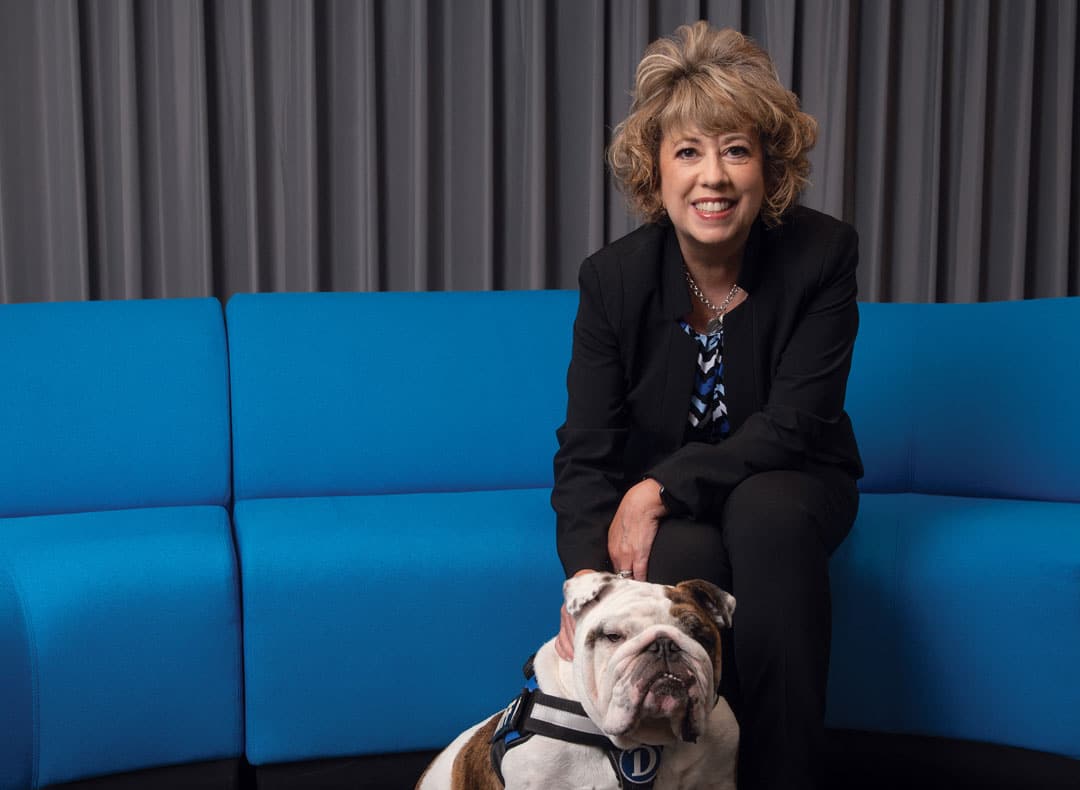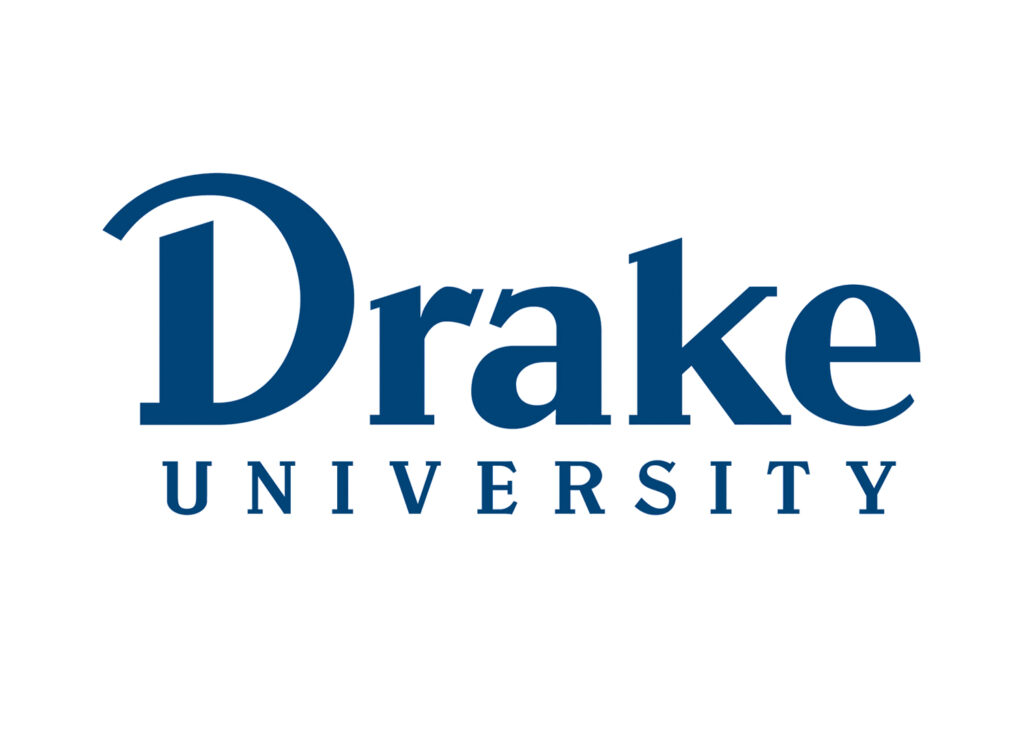A Closer Look: Angela Gallagher
Director of Executive Education at Drake University’s Zimpleman College of Business
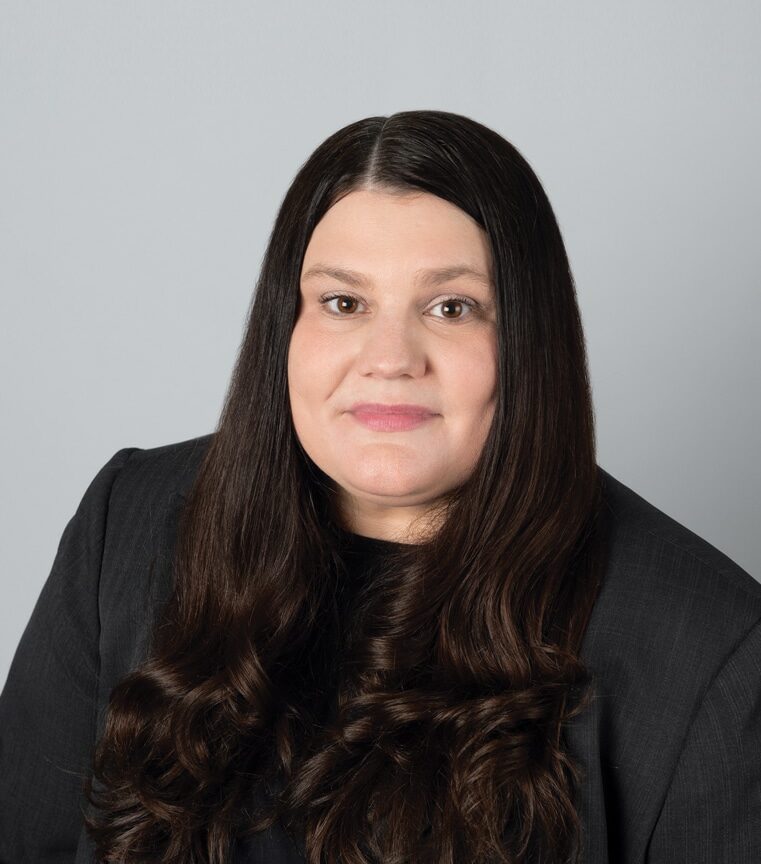
As director of Executive Education at Drake University’s Zimpleman College of Business, Angela Gallagher’s job centers on enabling people in business to make the most of their capability.
That’s an aspiration she’s been familiar with since childhood.
“My parents, they really fueled my love of learning,” Gallagher said. “We would have family dinners and discuss our day around the family dinners, like, what did I learn in school? What was I interested in? What were the activities? My parents really encouraged me to ask questions. … I call them the kitchen table topics.”
Sharing kitchen table topics was about much more than just recapping a typical day.
“Looking back, I kind of felt like my parents were encouraging me like it was my seat at the table,” she said. “I felt very encouraged to try things, to be curious, to just follow my love of learning and what I wanted to do with that. … It brings me a lot of joy and positive energy to be able to help develop others now.”
The Business Record checked in with Gallagher to learn more about the niche her department at Drake fills for the business world and what is ahead for Executive Education.
This Q&A has been lightly edited and condensed for clarity. This interview was conducted in early August.
What is Executive Education?
I’m going to start with a little history about how it got started. I think that foundation is cornerstone to it. We actually started with the Drake Leading Others program, and it was created as a response to an inquiry from many companies and their desire to advance leadership development in their organizations, preparing leaders for that next senior leadership role. Drake University invested in the Leading Others program, the creation of it, working with an advisory council of HR leaders who provided feedback on key leadership competencies needed for mid- to senior-level leadership, as well as program content. So Executive Education is, for us, a signature learning experience, which combines the unique opportunity to maximize learning and development while minimizing time away from the office. And through a combination of interactive classroom sessions, group discussions and executive coaching, leaders will move through a strategically guided curriculum in a rich, collaborative and reflective learning environment.
Is there a typical student for this, or is it wide-ranging?
We have two cornerstone programs. One is for the new and emerging leader, which helps them transition from being a team member to a team lead. And then our Leading Others program is for those mid- to senior-level leaders who are part of a team leading organizational change, and moving up within part of succession planning and within the organization.
What is distinctive about Executive Education at Drake, specifically?
I really believe it’s that signature learning experience, coming back to maximizing that development while they’re here, and [the combination of] interactive classroom sessions, group discussions and the executive coaching. It’s also neat that in July of last year, it became part of the Zimpleman College of Business. By moving under the Zimpleman College of Business, the program will continue to have a major impact on professionals across the Midwest and beyond, but now it has the added benefit of the applied knowledge and relevant business resources of the university’s globally accredited business school.
With the people you see and the students you meet, what types of problems do leaders often confront that Drake’s lessons can help with?
Some common themes that we see bubbling up: One would be change leadership. After a decade that’s included lots of disruptors, from a global pandemic, technology change with Zoom and ChatGPT and tumultuous economic change — how do businesses prepare leaders to uplift their teams and their organizations? We know that shift happens as part of change. So leaders are focusing on their authenticity, their resiliency and their confidence to be able to successfully navigate through these changes. Our programs help organizations invest in their leaders through our transformational developmental experiences. We have an ongoing process to refine our programs based on these lived experiences that participants have, as well as external influences and ongoing feedback.
A second theme that we see is the fast pace of change. It provides challenges, but we like to turn that to say also these challenges serve as catalysts for leadership development. By focusing on the personal growth and the increase in resiliency, we’re equipping leaders with the necessary skills to thrive in these competitive environments.
A third area would be just developing those new and emerging people leaders. They’re working with virtual and in-person teams, and so, to help them on that transition from being a team member to a team lead and giving them that strong foundation.
You were a coach for Executive Education at Drake before becoming director. Are the jobs completely different, or does one inform the other?
I lean into my coaching skills, being director. Having just about nine months ago stepped into the role, I was very honored to transition to leading our Executive Education. I call it our Drake delivery team, because we work together as a team. Leadership development fuels my passion to really help others achieve their goals and unlock their leadership potential. With the heart of that leadership coach in me, it’s wonderful to see others aim high to set their goals and objectives to intentionally plan to give back in ways that align to their purpose and then also unlock their potential. So, as a coach, I was able to support them on their leadership journey, both personally and professionally. And I got to see that transformation. What I really enjoyed, too, is the fact that sometimes you have to slow down to speed up, and we talk about that a lot in coaching as well as in the program. To watch organizations invest in their leaders, and then watching these leaders invest in themselves as part of this for that growth, and that slowing down to speed up, whether I was in the coaching role or now as the director, it’s rewarding to be just a small part of their journey and to see that happening.
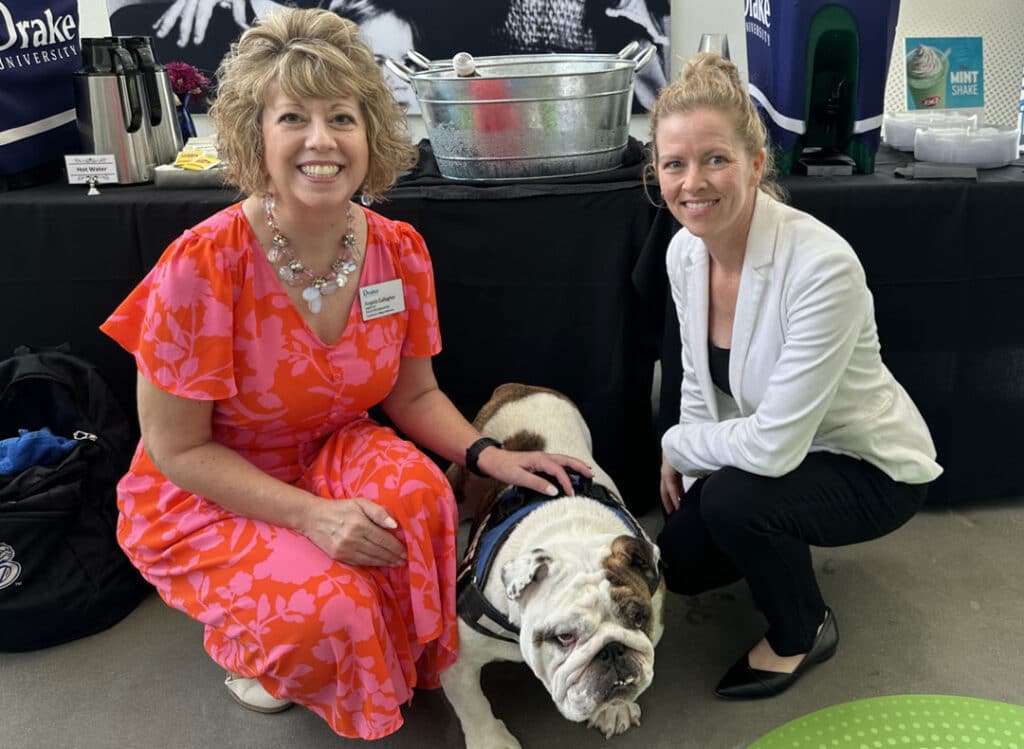
Angela Gallagher poses with Pamela Moore, Drake’s Executive Education program manager, and Griff II. Submitted photo
What is a typical day like for you? Or is there a typical day?
I smile at this one. It may include strategic conversations regarding our programs, with leaders or organizations. It could be interactions with organizations and community leaders about their talent development needs and how we can collaborate together to help them achieve their goals. It might be supporting a leadership journey of a cohort, if we’re together as part of our week in class. It could be a photo opportunity with Griff. We invite business leaders and alumni to come back and speak at panels and networking events.
How do you measure the program’s success? And where do you want it to go in the next five years?
Over the last nine years, more than 1,000 professionals have been through and been shaped by Drake’s Executive Education programs, through both the open enrollment and the custom leadership programs that we offer. We have both qualitative and quantitative measures as part of our learning scorecard. An example of the qualitative would be testimonials that we have from our participants and graduates that you can see on our website and in our marketing materials. They also come and speak at alumni panels and events for us, which we are very appreciative of. When it comes to the data part, cohort graduates or participants have noted that they’ve experienced a 50% increase in promotion rates, as well as a 70% increased executive responsibilities because of their engagement in our Leading Others program. So those are two metrics that we watch very closely.
When I think about Executive Education’s futures, there’s a couple of things. Short term, we’re introducing a new program this spring called Executive Influence. It will allow leaders to reflect, practice and enhance their influence skills, in a small group of high performers. They’ll learn about the art of persuasion, understanding personal influence styles and recognizing their existing strengths. It’s a hybrid program that will kick off this spring. So we’ll meet some in person and some virtual, and it’ll occur over the four months where participants will build their confidence and emerge as more influential and inspiring leaders. We’re very excited to introduce that this spring.
Really, at the core of it, is that we want to help leaders at all levels. Our goal is to offer a range of programs like Executive Influence to transform leaders and optimize organizations. Thinking a little bit further out, maybe not quite five years, I really want to enhance the strategic plan that’s here. And so just understanding the talent development needs in the community and then determining what programs best meet those needs from the bigger Drake ecosystem, is really what I’m leaning into.
Talk a little more about how your job evolved through your education and earlier jobs to where you are now.
I have had a lot of wonderful teachers and professors in my life that have really encouraged that love of learning. By my sophomore year during my undergraduate, I was in a class with a professor, it was a marketing class, and she was just very inspiring. By the end of class, I knew that marketing was at my core, and I wanted to work in a couple of different sectors. I was already thinking about how I could map out my career; she had just really moved me in that passion for learning and the experiences that I wanted to have.
It was at John Deere and John Deere Financial that I got introduced to the coaching culture. I went through training while I was there. I became an internal coach while I was at Deere, and then it was really rewarding to be able to do that. I had a manager and former leader that was actually a coach in Drake’s Executive Education. Her name is Holly Dierks. She is a dear friend, and she was aware of my background and my passion, and when I was looking to do something a little bit different, she was like, “I think you would be wonderful as a Drake coach. Would you like to talk to the director” at the time and consider that role?
Fast-forward, I became a coach for Drake Executive Education, and then did that for a few years before the opportunity came for the director role. Education, which includes communication and coaching from that perspective has always been, as I reflect, part of my purpose. And as I have been involved in the community, I’ve looked for ways to align with things that would help educate others. So when I think about the Food Bank of Iowa, I’ve been on their philanthropic committee for a few years, and I just recently joined their board of directors.
While I was at Deere, in addition to learning from the coaching culture, I also had the opportunity to go back and get my MBA from Drake, so I am a Drake alum. As the first in my family to go to college, I was grateful for the opportunity to continue my education.
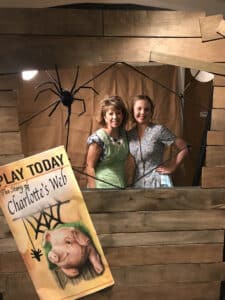
Angela Gallagher and her daughters were cast members of the Des Moines Community Playhouse’s production of “Charlotte’s Web.” Submitted photo
How do you spend your spare time?
We spend a lot of time together as a family. We love to travel. We love to volunteer together. We like our daughter to see, growing up, the ways that you can give back so that she can find things that align to her purpose. So we like to lead by example.
I have a really fun book club. Reading is a passion of mine. Not only the conversation, which is wonderful, but to be able to share the love of reading and what we see within the stories and what we take away.
I like to recharge, both creatively and for energy, through exercise. Power walking is my thing, when I’m stuck on thinking through something, or maybe I just want to stretch my thinking outside the box. Or maybe I really need the movement and the energy that that brings — that’s my go-to.
We love to volunteer both on and off stage. My daughter and I, a few years ago, were cast in a play at the Children’s Theatre at the Des Moines Community Playhouse. We had a lot of fun doing that together. It was “Charlotte’s Web,” one of my daughter’s favorite stories, so to bring that story to life for other children was just so rewarding for us, and for us to have that memory together is very fun.
I’m also on the Alzheimer’s Association Iowa Chapter board of directors; the education component of that is so key from a standpoint of the research that’s underway and the discoveries they’ve had, but also things like the 10 early warning signs of Alzheimer’s disease and many forms of dementia.
Is there anything I didn’t ask you that I should have that you really want people to know?
By being part of the Zimpleman College of Business, I was able to collaborate with leadership and faculty to determine that our cornerstone program, Leading Others, will now satisfy six credits in our Master of Business Administration, our MBA program, and so that is brand new. You’ll see it in our marketing materials, and we’re very excited about that for folks that may be looking to continue on with their education and development.
At a glance
Hometown: Bondurant
Family: Husband (Terry), daughter, one dog
Education: Bachelor’s degree in business administration from Iowa State University, Master of Business Administration from Drake University.
Activities: Spending time with family, traveling, volunteering and playing board games; reading with a group of friends in my book club; recharging both for energy and creativity through exercise; volunteering on and off stage at the Des Moines Community Playhouse.
Community involvement: Food Bank of Iowa board, Alzheimer’s Association Iowa Chapter board, United Way of Central Iowa Education Success Cabinet.
Contact: angela.gallagher@drake.edu

Nicole Grundmeier
Nicole Grundmeier is a staff writer and copy editor at Business Record. She writes for Fearless and covers arts and culture.

